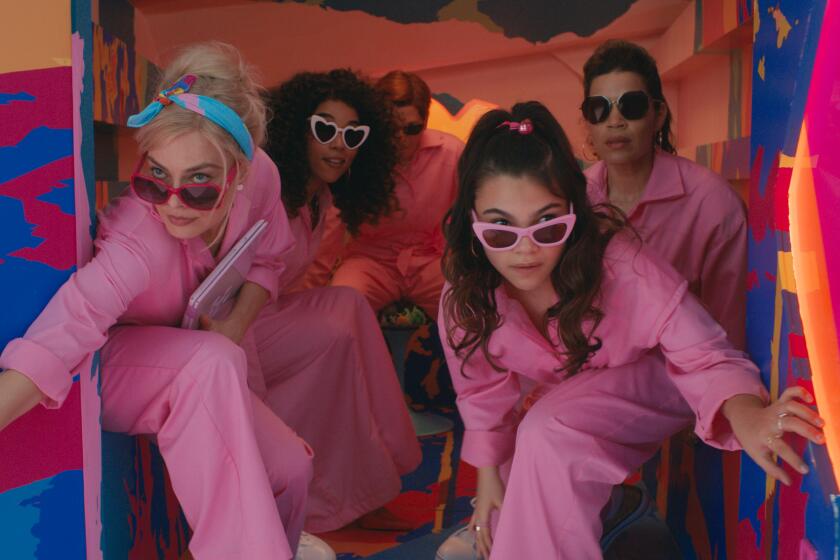Cannes dreams count more than a place to sleep
“I haven’t had a proper meal today,” says London-based Kathy Hill, hanging outside a local bar called Le Petit Majestic. “I only brought 200 euros [around $235] to last for four days. I can’t carry much from the supermarket all around Cannes, so all I’ve eaten today is Nutella and nuts.”
Hill has come to this Riviera resort “looking to find the pieces of the packages I need for me to be able to direct -- acting talent, sales agent, distributors, but mainly co-producers who can raise money” for her $8-million feature, a mystical romance called “Just Another Angel.” She has no contacts or accreditation, and works the crowd a few streets up from the Croisette at this low-rent watering hole, where beer is served in plastic cups for 3 euros a pop, and hundreds spill out into the street until 4 a.m. “Apparently this is where everybody comes after their parties are finished,” she says. “I just met somebody who told me there is a producer in England who is interested in working with first-time directors, so now I’m starting to think that this has all been worth it.”
Think “Cannes,” and the images that come to mind are movie stars, moguls and expense account-endowed industry pros taking meetings, lounging in outdoor cafes, shopping for Fendi purses and dancing at fabulous villa parties where multimillion-dollar deals are struck. Although all that does take place here at the film industry’s largest festival, there is also another, less visible population. They are the dreamers, the hangers-on, who come on the slimmest of budgets and struggle to just keep a roof over their heads and a few bites of baguette in their stomachs while they pursue whatever agenda they have in mind. And when it comes to night life, they invariably turn up at Le Petit.
“This is my third time in Cannes,” says another Petit patron, Australian screenwriter John Peters, who lives most of the year in London. “At all three events I had to sleep on floors, with no money.” At the end of the night, he’ll make his way to a hotel room in Antibes, 10 miles away, which he shares with four others, each paying around 30 euros a night. Best-case scenario? “That would be that I’m walking down the street and I come across a 55-year-old L.A.-based producer talking on the phone about a movie,” the 33-year-old says. “I tell him that I’ve got a better [idea].
“The main problem with bars like this,” he says, “is that all the people you meet are just like me.” Still, for Peters and others, it’s worth it to try your luck here even if it doesn’t work out. “After all, if you don’t join the lottery,” he says, “you can’t win anything.”
According to Jean-Jacques Lottermoser, marketing and commercial director of the Office du Tourisme and the Palais des Festivals, “Cannes is like an expensive hotel, except we’re a city.” For the low-rent crowd, he says, doing the festival is possible, but he recommends a bit of distance. “If you stay in Nice, you can take the train and within 30 minutes you are in Cannes.”
As far as the general conception that in a pinch, you can sleep on the beach, Lottermoser says, “No way.” Anyone who’s seen the army of patrolling Rottweilers knows why. As far as eating goes, “even if you go a few blocks from the Palais, you can get a full menu for around 10 euros,” he says. “That is not too bad.”
But for some, even that is a budget-breaker.
“I probably have spent under 100 EU, not including accommodation,” says Lara Woolf, a 28-year-old Australian who has worked as a teacher in London for the past four months to make money for this trip. “I go to the supermarket. And the Sunday [outdoor] market, where you can get fresh food.” Although some book 200-euro-a-night hotel rooms a year in advance, Woolf, who dreams of being a writer-producer, has managed to score one of the 30 beds at Chalit, Cannes’s only hostel, as recently as mid-January. “My office has been the handicapped toilet at the Hotel Majestic,” she says.
For those who prefer not to totally wing it on their own, the Cannes Film Festival does offer a few low-rent options.
“I’m paying Kodak to hook me up with a place to stay and a festival badge, and I have to work for them for [a few] hours a day for free,” says Alexis Prindle, a USC film student, who has been one of the 100 students accepted to the Kodak Worldwide Student Program. She is serving coffee to the meeting-takers at the American Pavilion, a hospitality tent for American visitors. While she doesn’t have an agenda, the experience, she says, is teaching her “what kind of people can help you, what kind can’t and what you need to put a deal together.” Her bed is in an apartment about three miles away in the suburb of La Bocca -- a 45-minute walk or a half-hour bus ride. “I have a bunk bed in my room,” she says.
But, she adds, “I’m not as bad off as the Troma people.”
If there is a bottom rung on the festival social ladder, it’s the crew at Troma Films, a New York-based schlock film company that provides a place in an apartment for any volunteer willing and motivated enough to spatter themselves with fake blood, wear ridiculous outfits and go out on the street armed with bullhorns to “promote.” The previous night, their landlady made a surprise visit and found 20 people splayed out over two rooms and a hallway, the walls spattered red, and plastic severed limbs all over. She nearly evicted them.
“It took eight people and a maid to clean the place up, with the landlady yelling at us all the time,” says Dan Douglas, 24, a rock musician from Annapolis, Md. He thinks volunteering at Troma is a “good deal if you have something to promote,” in his case, his music, which he’d like to see on movie soundtracks.
Exploitation? Mais, non, according to the company’s president and most prolific director-producer, Lloyd Kaufman. “I’m turning them on to the people they need to meet. I’m encouraging them to be bold and use the Troma name to gain access to people who can greenlight their projects, and I also give them passes to enter the screenings.”
More to the point, Kaufman says, he doesn’t charge anybody anything. “Everything here is free and we stay only five minutes away.”
Indeed, many in the Troma crowd look to Kaufman -- the brains behind such anti-classics as “Toxic Avenger” -- as almost a father figure. “I was going to work for Lloyd Kaufman in Malibu, but I found out he would be in Cannes so I came here,” says Carrie Godsiff, 19, a fine arts student from London. Godsiff spends her mornings parading through Cannes in a leopard-print miniskirt and a Troma bumper sticker pasted above her bra, and the evenings trying to scam into parties and encouraging people to buy her drinks at Le Petit Majestic. Altogether, she has brought with her 100 English pounds to last the entire festival.
“I’m absolutely managing,” Godsiff says. “You really learn to live on no budget here.” Her biggest splurge? “I spent 3.90 for cigarettes,” she says, holding up a pack of Marlboro Lights. “But that’s a good deal,” she explains. “It keeps me from eating.”
More to Read
Only good movies
Get the Indie Focus newsletter, Mark Olsen's weekly guide to the world of cinema.
You may occasionally receive promotional content from the Los Angeles Times.










